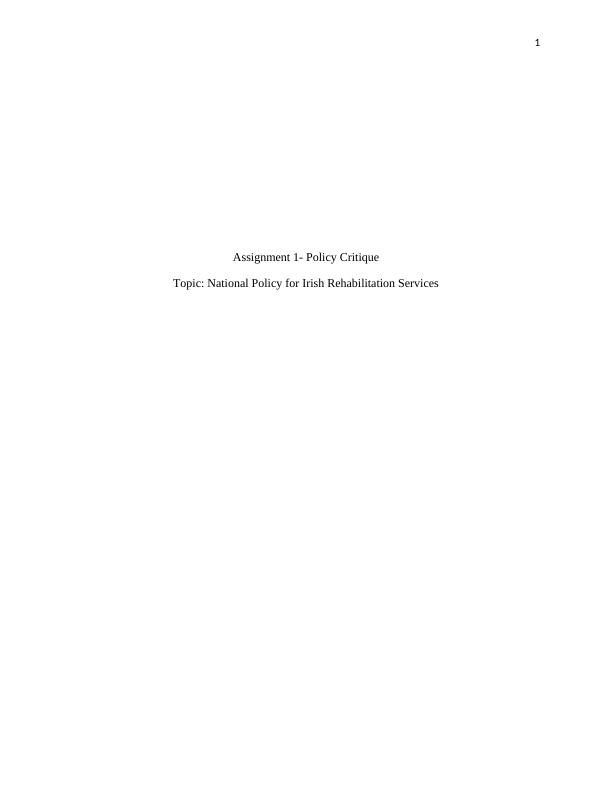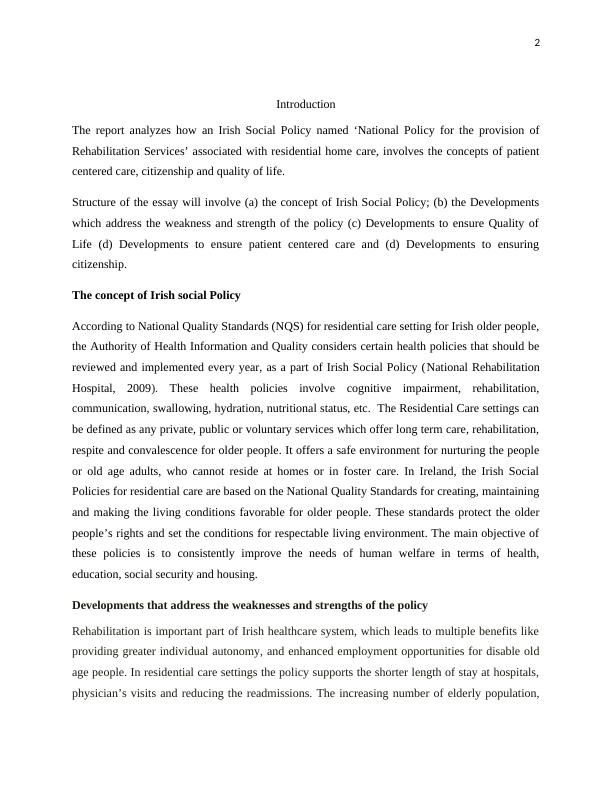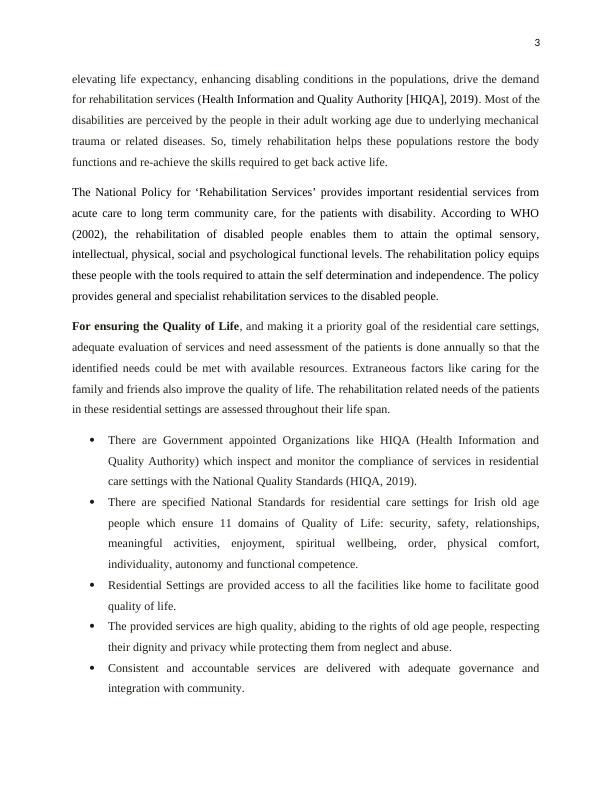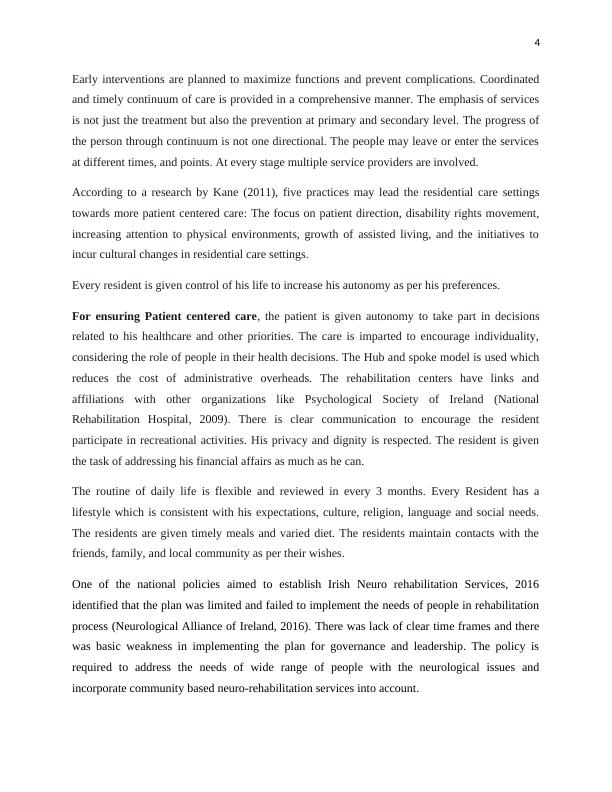Analysis of Ireland's National Policy for Rehabilitation Services: A Critique
Added on 2023-04-26
11 Pages2890 Words326 Views
1
Assignment 1- Policy Critique
Topic: National Policy for Irish Rehabilitation Services
Assignment 1- Policy Critique
Topic: National Policy for Irish Rehabilitation Services

2
Introduction
The report analyzes how an Irish Social Policy named ‘National Policy for the provision of
Rehabilitation Services’ associated with residential home care, involves the concepts of patient
centered care, citizenship and quality of life.
Structure of the essay will involve (a) the concept of Irish Social Policy; (b) the Developments
which address the weakness and strength of the policy (c) Developments to ensure Quality of
Life (d) Developments to ensure patient centered care and (d) Developments to ensuring
citizenship.
The concept of Irish social Policy
According to National Quality Standards (NQS) for residential care setting for Irish older people,
the Authority of Health Information and Quality considers certain health policies that should be
reviewed and implemented every year, as a part of Irish Social Policy (National Rehabilitation
Hospital, 2009). These health policies involve cognitive impairment, rehabilitation,
communication, swallowing, hydration, nutritional status, etc. The Residential Care settings can
be defined as any private, public or voluntary services which offer long term care, rehabilitation,
respite and convalescence for older people. It offers a safe environment for nurturing the people
or old age adults, who cannot reside at homes or in foster care. In Ireland, the Irish Social
Policies for residential care are based on the National Quality Standards for creating, maintaining
and making the living conditions favorable for older people. These standards protect the older
people’s rights and set the conditions for respectable living environment. The main objective of
these policies is to consistently improve the needs of human welfare in terms of health,
education, social security and housing.
Developments that address the weaknesses and strengths of the policy
Rehabilitation is important part of Irish healthcare system, which leads to multiple benefits like
providing greater individual autonomy, and enhanced employment opportunities for disable old
age people. In residential care settings the policy supports the shorter length of stay at hospitals,
physician’s visits and reducing the readmissions. The increasing number of elderly population,
Introduction
The report analyzes how an Irish Social Policy named ‘National Policy for the provision of
Rehabilitation Services’ associated with residential home care, involves the concepts of patient
centered care, citizenship and quality of life.
Structure of the essay will involve (a) the concept of Irish Social Policy; (b) the Developments
which address the weakness and strength of the policy (c) Developments to ensure Quality of
Life (d) Developments to ensure patient centered care and (d) Developments to ensuring
citizenship.
The concept of Irish social Policy
According to National Quality Standards (NQS) for residential care setting for Irish older people,
the Authority of Health Information and Quality considers certain health policies that should be
reviewed and implemented every year, as a part of Irish Social Policy (National Rehabilitation
Hospital, 2009). These health policies involve cognitive impairment, rehabilitation,
communication, swallowing, hydration, nutritional status, etc. The Residential Care settings can
be defined as any private, public or voluntary services which offer long term care, rehabilitation,
respite and convalescence for older people. It offers a safe environment for nurturing the people
or old age adults, who cannot reside at homes or in foster care. In Ireland, the Irish Social
Policies for residential care are based on the National Quality Standards for creating, maintaining
and making the living conditions favorable for older people. These standards protect the older
people’s rights and set the conditions for respectable living environment. The main objective of
these policies is to consistently improve the needs of human welfare in terms of health,
education, social security and housing.
Developments that address the weaknesses and strengths of the policy
Rehabilitation is important part of Irish healthcare system, which leads to multiple benefits like
providing greater individual autonomy, and enhanced employment opportunities for disable old
age people. In residential care settings the policy supports the shorter length of stay at hospitals,
physician’s visits and reducing the readmissions. The increasing number of elderly population,

3
elevating life expectancy, enhancing disabling conditions in the populations, drive the demand
for rehabilitation services (Health Information and Quality Authority [HIQA], 2019). Most of the
disabilities are perceived by the people in their adult working age due to underlying mechanical
trauma or related diseases. So, timely rehabilitation helps these populations restore the body
functions and re-achieve the skills required to get back active life.
The National Policy for ‘Rehabilitation Services’ provides important residential services from
acute care to long term community care, for the patients with disability. According to WHO
(2002), the rehabilitation of disabled people enables them to attain the optimal sensory,
intellectual, physical, social and psychological functional levels. The rehabilitation policy equips
these people with the tools required to attain the self determination and independence. The policy
provides general and specialist rehabilitation services to the disabled people.
For ensuring the Quality of Life, and making it a priority goal of the residential care settings,
adequate evaluation of services and need assessment of the patients is done annually so that the
identified needs could be met with available resources. Extraneous factors like caring for the
family and friends also improve the quality of life. The rehabilitation related needs of the patients
in these residential settings are assessed throughout their life span.
There are Government appointed Organizations like HIQA (Health Information and
Quality Authority) which inspect and monitor the compliance of services in residential
care settings with the National Quality Standards (HIQA, 2019).
There are specified National Standards for residential care settings for Irish old age
people which ensure 11 domains of Quality of Life: security, safety, relationships,
meaningful activities, enjoyment, spiritual wellbeing, order, physical comfort,
individuality, autonomy and functional competence.
Residential Settings are provided access to all the facilities like home to facilitate good
quality of life.
The provided services are high quality, abiding to the rights of old age people, respecting
their dignity and privacy while protecting them from neglect and abuse.
Consistent and accountable services are delivered with adequate governance and
integration with community.
elevating life expectancy, enhancing disabling conditions in the populations, drive the demand
for rehabilitation services (Health Information and Quality Authority [HIQA], 2019). Most of the
disabilities are perceived by the people in their adult working age due to underlying mechanical
trauma or related diseases. So, timely rehabilitation helps these populations restore the body
functions and re-achieve the skills required to get back active life.
The National Policy for ‘Rehabilitation Services’ provides important residential services from
acute care to long term community care, for the patients with disability. According to WHO
(2002), the rehabilitation of disabled people enables them to attain the optimal sensory,
intellectual, physical, social and psychological functional levels. The rehabilitation policy equips
these people with the tools required to attain the self determination and independence. The policy
provides general and specialist rehabilitation services to the disabled people.
For ensuring the Quality of Life, and making it a priority goal of the residential care settings,
adequate evaluation of services and need assessment of the patients is done annually so that the
identified needs could be met with available resources. Extraneous factors like caring for the
family and friends also improve the quality of life. The rehabilitation related needs of the patients
in these residential settings are assessed throughout their life span.
There are Government appointed Organizations like HIQA (Health Information and
Quality Authority) which inspect and monitor the compliance of services in residential
care settings with the National Quality Standards (HIQA, 2019).
There are specified National Standards for residential care settings for Irish old age
people which ensure 11 domains of Quality of Life: security, safety, relationships,
meaningful activities, enjoyment, spiritual wellbeing, order, physical comfort,
individuality, autonomy and functional competence.
Residential Settings are provided access to all the facilities like home to facilitate good
quality of life.
The provided services are high quality, abiding to the rights of old age people, respecting
their dignity and privacy while protecting them from neglect and abuse.
Consistent and accountable services are delivered with adequate governance and
integration with community.

4
Early interventions are planned to maximize functions and prevent complications. Coordinated
and timely continuum of care is provided in a comprehensive manner. The emphasis of services
is not just the treatment but also the prevention at primary and secondary level. The progress of
the person through continuum is not one directional. The people may leave or enter the services
at different times, and points. At every stage multiple service providers are involved.
According to a research by Kane (2011), five practices may lead the residential care settings
towards more patient centered care: The focus on patient direction, disability rights movement,
increasing attention to physical environments, growth of assisted living, and the initiatives to
incur cultural changes in residential care settings.
Every resident is given control of his life to increase his autonomy as per his preferences.
For ensuring Patient centered care, the patient is given autonomy to take part in decisions
related to his healthcare and other priorities. The care is imparted to encourage individuality,
considering the role of people in their health decisions. The Hub and spoke model is used which
reduces the cost of administrative overheads. The rehabilitation centers have links and
affiliations with other organizations like Psychological Society of Ireland (National
Rehabilitation Hospital, 2009). There is clear communication to encourage the resident
participate in recreational activities. His privacy and dignity is respected. The resident is given
the task of addressing his financial affairs as much as he can.
The routine of daily life is flexible and reviewed in every 3 months. Every Resident has a
lifestyle which is consistent with his expectations, culture, religion, language and social needs.
The residents are given timely meals and varied diet. The residents maintain contacts with the
friends, family, and local community as per their wishes.
One of the national policies aimed to establish Irish Neuro rehabilitation Services, 2016
identified that the plan was limited and failed to implement the needs of people in rehabilitation
process (Neurological Alliance of Ireland, 2016). There was lack of clear time frames and there
was basic weakness in implementing the plan for governance and leadership. The policy is
required to address the needs of wide range of people with the neurological issues and
incorporate community based neuro-rehabilitation services into account.
Early interventions are planned to maximize functions and prevent complications. Coordinated
and timely continuum of care is provided in a comprehensive manner. The emphasis of services
is not just the treatment but also the prevention at primary and secondary level. The progress of
the person through continuum is not one directional. The people may leave or enter the services
at different times, and points. At every stage multiple service providers are involved.
According to a research by Kane (2011), five practices may lead the residential care settings
towards more patient centered care: The focus on patient direction, disability rights movement,
increasing attention to physical environments, growth of assisted living, and the initiatives to
incur cultural changes in residential care settings.
Every resident is given control of his life to increase his autonomy as per his preferences.
For ensuring Patient centered care, the patient is given autonomy to take part in decisions
related to his healthcare and other priorities. The care is imparted to encourage individuality,
considering the role of people in their health decisions. The Hub and spoke model is used which
reduces the cost of administrative overheads. The rehabilitation centers have links and
affiliations with other organizations like Psychological Society of Ireland (National
Rehabilitation Hospital, 2009). There is clear communication to encourage the resident
participate in recreational activities. His privacy and dignity is respected. The resident is given
the task of addressing his financial affairs as much as he can.
The routine of daily life is flexible and reviewed in every 3 months. Every Resident has a
lifestyle which is consistent with his expectations, culture, religion, language and social needs.
The residents are given timely meals and varied diet. The residents maintain contacts with the
friends, family, and local community as per their wishes.
One of the national policies aimed to establish Irish Neuro rehabilitation Services, 2016
identified that the plan was limited and failed to implement the needs of people in rehabilitation
process (Neurological Alliance of Ireland, 2016). There was lack of clear time frames and there
was basic weakness in implementing the plan for governance and leadership. The policy is
required to address the needs of wide range of people with the neurological issues and
incorporate community based neuro-rehabilitation services into account.

End of preview
Want to access all the pages? Upload your documents or become a member.
Related Documents
Health and social-political in aged carelg...
|7
|1722
|13
Disadvantages and Social Exclusion Faced by Physically Disabled Older Adults in UKlg...
|8
|2347
|117
Aged Care Nursing in Australia Despitelg...
|14
|3720
|27
Aging Individuals with Intellectual Disabilities Research Paper 2022lg...
|13
|3516
|24
Designing an Aged Care Program for Senior Citizens in Dublinlg...
|14
|3538
|129
Community Care: Care Practice in the Communitylg...
|10
|3263
|140
